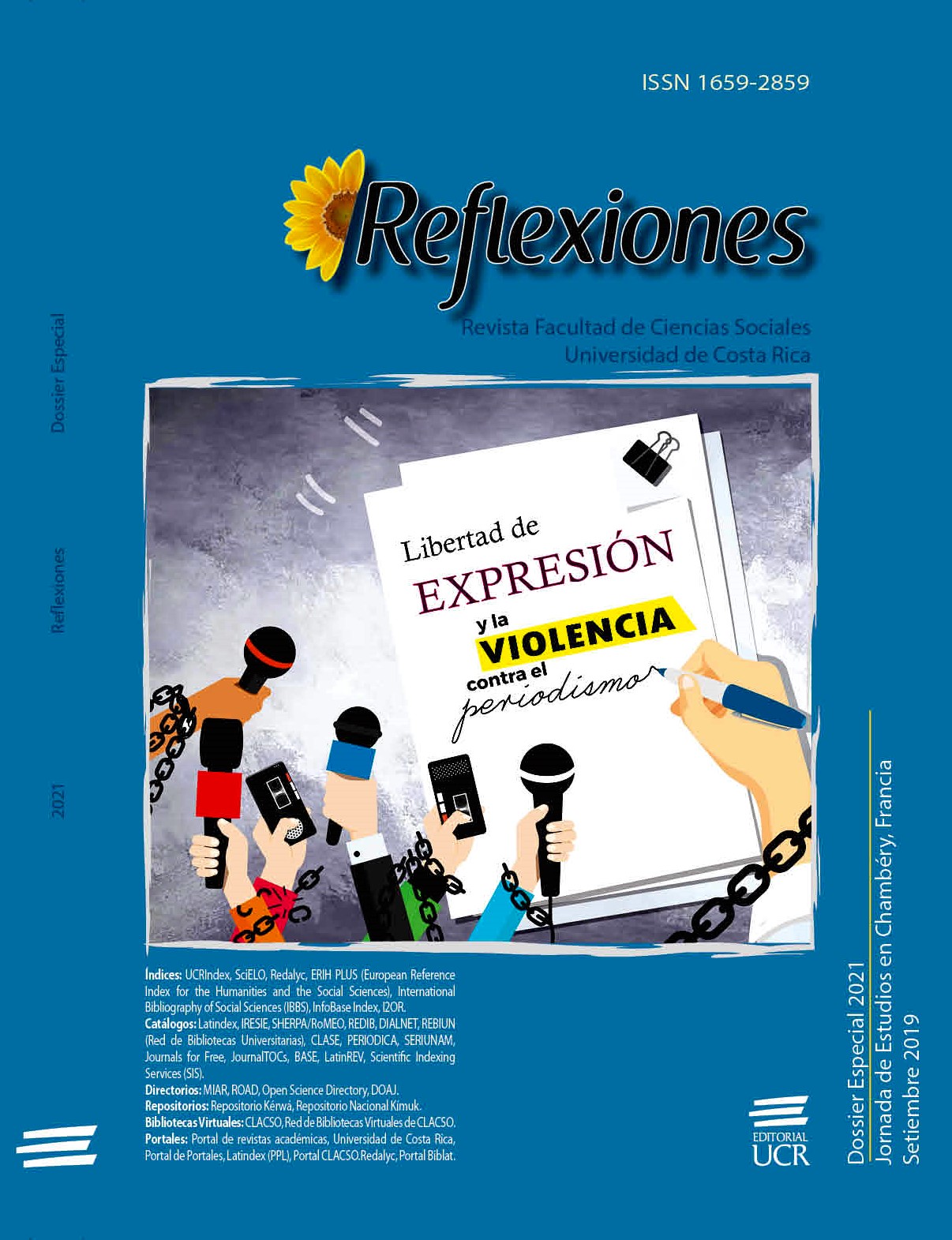Abstract
Introduction
On December 28th, 2006, the President Hugo Chávez announced to the population that the State will not renew the radio licence to the television channel: Radio Caracas Televisión. Consequently, a legal process and a political conflict were initiated, leaving a milestone between the government and the private media.
Objective
The conflict between these actors has been reconstructed based on information obtained through non-Governmental Organization. Having as objectives: first, to show the degradation of freedom of expression in Venezuela and; second, to introduce a reflection on the condition of justice in this country.
Method and technique
The data information shows the chronological evolution of the conflict and the cases show the strategies used to yield the interests of journalists and media owners.
Outcome
This conflict, whose purpose was the moral elimination of the other, highlights three conditions of the Venezuelan political order: the installation of routine authoritarian governance, the presence of a new ruling party that is the winner of the conflict and the absence of an independent Judicial System.
Conclusions
In 2019, the freedom to opinion and information had been lost in Venezuela, becoming a utilitarian object for the government. This conflict and its ending show how the problems that Venezuela had before 1999 have deepened, both from the point of view of freedom of expression and the Administration of Justice.
References
ANC (Asamblea Nacional Constituyente). 1999 decreto de Reorganización del Poder Judicial y el Sistema Penitenciario, Pub. L. No. Gaceta Oficial nº 36.805
Asociación Venezolana de Derecho Tributario. 1985. La Corrupción en Venezuela. Caracas, Venezuela: Vadell Hermanos Editores.
Brewer Carías, Allan. 2012. “Sobre la ausencia de independencia y autonomía judicial en Venezuela, a los doce años de vigencia de la Constitución de 1999”. En Independencia Judicial, Colección Estado de Derecho, Tomo 1: 9‑103. Caracas, Venezuela: Fundación de Estudios de Derecho Administrativo, Universidad Metropolitana.
_2015. Cambio político y consolidación del Estado de derecho 1958-1998. Caracas, Venezuela: Editorial Jurídica Venezolana.
Cañizález, Andrés. 2015. “El caso de Globovisión y la implantación del modelo mixto-autoritario en el sistema de medios”. Iberoamericana 15: 127‑140.
Chávez, Hugo. 2002. Alocución por la crisis del país del Comandante presidente Hugo Chávez; del 11 de abril de 2002. Palacio de Miraflores, Caracas, Venezuela. Instituto de Altos Estudios del Pensamiento del Comandante Supremo Hugo Rafael Chávez Frías. Disponible en: http://www.todochavez.gob.ve/ Consultado el 10 de marzo de 2020.
CIDH (Comisión Interamericana de Derechos Humanos). 2002. Comunicado de prensa nº 23 Disponible en https://www.cidh.oas.org/annualrep/2002sp/cap.4d.htm
_2010. Denuncia n° 961/10 presentada a la Comisión Interamericana de Derechos Humanos. Nelson Mezerhane Gosen contra la República Bolivariana de Venezuela. Estados Unidos de América, Washington: CIDH
_DJ (Departement of Justice). [2019 ?] United States of America vs. Nicolas Maduro Moros, Diosdado Cabello Rondon, Hugo Rrmando Carvajal Barrios "el pollo," Cliver Antonio Alcala Cordones, Luciano Marin Arango "Ivan Marquez," and Seuxis Paucis Hernandez Solarte "Jesfis Santrich". https://www.justice.gov/file/1261581/download Consultado el 15 de abril de 2020.
Duque Corredor, Román. 2006. “Estado de derecho y de justicia: Desviaciones y manipulaciones. El estado de cosas inconstitucional”. En Provincia nº especial: 341‑360.
Espacio Público. 2002-2018. Situación del derecho a la libertad de expresión e información en Venezuela. Caracas, Venezuela: Espacio Público
El Nacional. 2014. “Maduro legislará contra medios por informar de inseguridad”. 8 de agosto. http://espaciopublico.ong/maduro-regula-medos-dictador
Fauconnet, Paul y Mauss, Marcel. 1901. “Sociologie : objet et méthode”, en la Grande Encyclopédie, vol 30. France, Paris: Société anonyme de la Grande Encyclopédie.
Gaceta Oficial de la República de Venezuela. 1999a. Decreto de Reorganización del Poder Judicial y el Sistema Penitenciario. Gaceta nº 36.805. https://www.oas.org/juridico/spanish/ven_res51.pdf
_1999b. Decreto sobre el Régimen Transitorio del Poder Público. Gaceta nº 36.857. https://www.oas.org/juridico/spanish/ven_res50.pdf
_2004. Ley Orgánica del Tribunal Supremo de Justicia de la República Bolivariana de Venezuela, Gaceta nº 37.942. https://www.oas.org/juridico/spanish/mesicic2_ven_anexo_44_sp.pdf
_2010a. Ley Orgánica del Tribunal Supremo de Justicia de la República Bolivariana de Venezuela. Gaceta nº 39.522. http://www.oas.org/juridico/PDFs/mesicic4_ven_ley_org_trib_sup_just.pdf
_2010b. Ley de Reforma parcial del Código de ética del juez venezolano y la jueza venezolana, Gaceta nº 39.493 (2010). http://www.oas.org/juridico/PDFs/mesicic4_ven_cod_eti_jue_ven.pdf
_2017. Decreto de Convocatoria a una Asamblea Nacional Constituyente. Gaceta nº 6.295 Extraordinario.
HRW (Human Rights Watch). 2012. Concentración y abuso de poder en Venezuela.
ICE (Immigration and Customs Enforcement). 2019. Violation of foreign corrupt practices act, money laundering, Gorrin Belizario. https://www.ice.gov/most-wanted/belisario
Lefort, Claude. 1999. La Complication. Retour sur le communisme. Paris, Francia: Fayard.
Martínez, José Gregorio. 2012. Caso Leocenis García: hazte el muerto y verás quién te llora. Caracas, Venezuela: Editorial CEC.
Ojeda, Sarai y Andrés Cañizález. 2017. «Recadi y la libertad de prensa en Venezuela (1986-87)». Comunicación: estudios venezolanos de comunicación 177: 7‑21.
OEA (Organización de Estados Americanos). 2018. Informe de la secretaría general de la Organización de los Estados Americanos y del panel de expertos internacionales independientes sobre la posible comisión de crímenes de lesa humanidad en Venezuela. Estados Unidos de América, Washington: OEA.
PROVEA. 2010. Venezuela: una década de protestas 2000-2010. Caracas, Venezuela: Provea.
Salgueiro, Adolfo. 2014. “Ante la venta de El Universal”. IPYS (Instituto Prensa y Sociedad). 22 de julio. https://ipysvenezuela.org/2014/07/22/por-adolfo-p-salgueiro-ante-la-venta-de-el-universal
Sojo, Iván. 2004. TV “Propaganda, en el paro nacional de Venezuela: ¿Quo vadis?” Revista Latina de Comunicación Social, 7 (58).
TSJ (Tribunal Supremo de Justicia). 2007. Sentencia No. 957, del 25 de mayo de 2007, de la Sala Constitucional del Tribunal Supremo de Justicia de la República Bolivariana de Venezuela. Exp. No.07-0731. Venezuela, Caracas.
Villegas, Ernesto. 2012. Abril, golpe adentro. Caracas, Venezuela: Fundación para la Cultura y las Artes.
Yajure, Jesús. 2014. “Así se gestó la venta del diario venezolano El Universal”. Runrunes. 13 de julio. https://urlz.fr/cxkV


